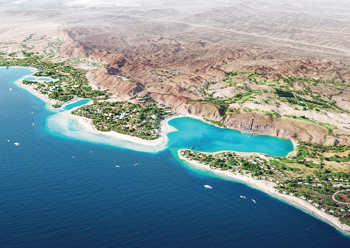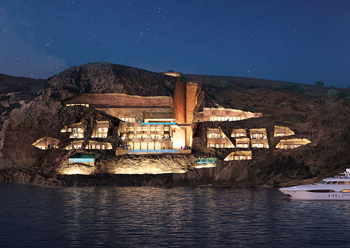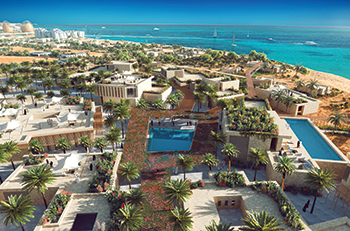Purity at its heart
01 May 2020
Amaala, the ultra-luxury destination set to take shape along Saudi Arabia’s northwestern coastline, will raise the bar for individuals seeking sustainable, transformative travel experiences, underpinned by ethical principles, the developer of the project tells Gulf Construction.
Set in the Prince Mohammad bin Salman Natural Reserve, its unique heritage and unspoiled landscape will allow travellers to immerse themselves in the finest wellness, art, culture, sports, and fitness offerings.
Named after the Arabic word for ‘hope’ and the ancient Sanskrit word for ‘purity’, the Amaala resort delivers upon Saudi Arabia’s Vision 2030 pillars of the cultivation of a vibrant society.
 |
|
Amaala ... set in the Prince Mohammed bin Salman Nature Reserve. |
Amaala will cover 3,800 sq km and include 2,500 hotel keys and more than 800 residential villas, apartments and estate homes, alongside 200 high-end retail, fine dining, wellness and recreation facilities. It will be brought to life by three of the world’s most recognised names in architecture and design. Foster + Partners, HKS Architects and Denniston International Architects and Planners will be responsible for creating innovative and sustainable design solutions across Amaala’s hospitality, residential, and retail offerings. Work on Phase One of the development is due to commence later this year.
Working closely with partners, the first-of-its-kind destination will ensure sustainability is a key thread throughout all stages of design, build, and operational phases. “This, however, is no easy feat. To build from the bottom up, the destination has put the natural environment at the centre of construction. It is this ethos – a razor-sharp focus on the preservation of natural habitats – that sets Amaala apart. The project is currently planning to develop less than six per cent of its large landholding, with the remainder managed for its conservation values,” a spokesman for the developer says.
Once completed, Amaala will be home to one of the largest solar energy farms in the GCC, supporting the ambitious sustainability target of being 100 per cent powered by renewable energy. Robust waste management and recycling processes will underpin Amaala’s operations, including avoidance of single use plastics. All wastewater will be treated and reused in landscaping and agriculture irrigation. The destination will also be home to an organic farm, harnessing sustainable farming techniques, to supply ample local produce for guests and employees.
According to HKS Architects, the newly-appointed masterplanner of two of the three unique communities within the development, Amaala will be the most sustainable development within the region.
HKS Architects is the masterplanner for Triple Bay and The Coastal Development communities at Amaala.
One of the largest wellness-based projects currently being planned, Amaala aims to be zero carbon, Kevin Underwood, Planning and Design Lead in EMEA and Head of the hospitality market sector at HKS, tells Gulf Construction.
 |
|
The Rock Hotel ... planned for Amaala. |
“We have a strict ecological policy in place that puts the protection of natural assets – the coral reef, sea grass, turtles and other sealife – at the heart of the design,” he adds.
Underwood says HKS Architects is bringing together the global expertise of the firm, using its knowledge of designing for healthcare, sports, and other applications to create something innovative and contemporary.
Triple Bay will offer a fully holistic wellness retreat, state-of-the-art diagnostic medical facilities, and authentic treatments influenced by the local environment and traditional practices.
The Coastal Development is being spearheaded as the defining hub of contemporary arts in the Middle East. It will feature an arts museum and cultural district, along with an amphitheatre for live performances.
Commenting on measures that can be taken to promote environmental sustainability, Underwood says: “It’s perhaps instructive to look at our plans for Amaala which, we believe, will be the most sustainable development in the region.
“Energy consumption is being reduced by looking at the principles of the ‘PassivHaus’ (passive house) approach and using them wherever possible. In practice, this means highly insulated buildings to radically reduce cooling and heating, reducing solar gain through orientation and building positioning,” he explains.
Underwood points out that landscaping has the largest impact on water use, and it is vital to consider how design can reduce consumption. “At Amaala, we are creating a ‘desertscape’, reducing areas of planting and balancing this with a ‘rockscape’. This, along with specifying local and regional species that are less water hungry, creates open spaces that are beautiful, sustainable and appropriate to the setting.
“A clear trend that we’re seeing, particularly amongst the very wealthy, is a move back to nature and an emphasis on experiences in the natural world. Many of these people are acutely aware of environmental issues and seem set on ensuring that their children are connected to, interested in and committed to protecting the planet.”
Meanwhile, leading architectural firm Denniston has been selected as the masterplanner for The Island, the third community within Amaala.
The Island will be the tranquil home of an exclusive art community, and an Arabian botanical garden incorporating sculptural pieces. It will house masterpieces across four key design elements: a contemporary art museum and academy, a Riviera-lifestyle artists’ colony, immersive artistic experiences, and art and sculpture co-creation opportunities.
- ‘We shall overcome’
- Red Sea wonder!
- Purity at its heart
- Ports set to expand
- Saudi Projects at a glance



